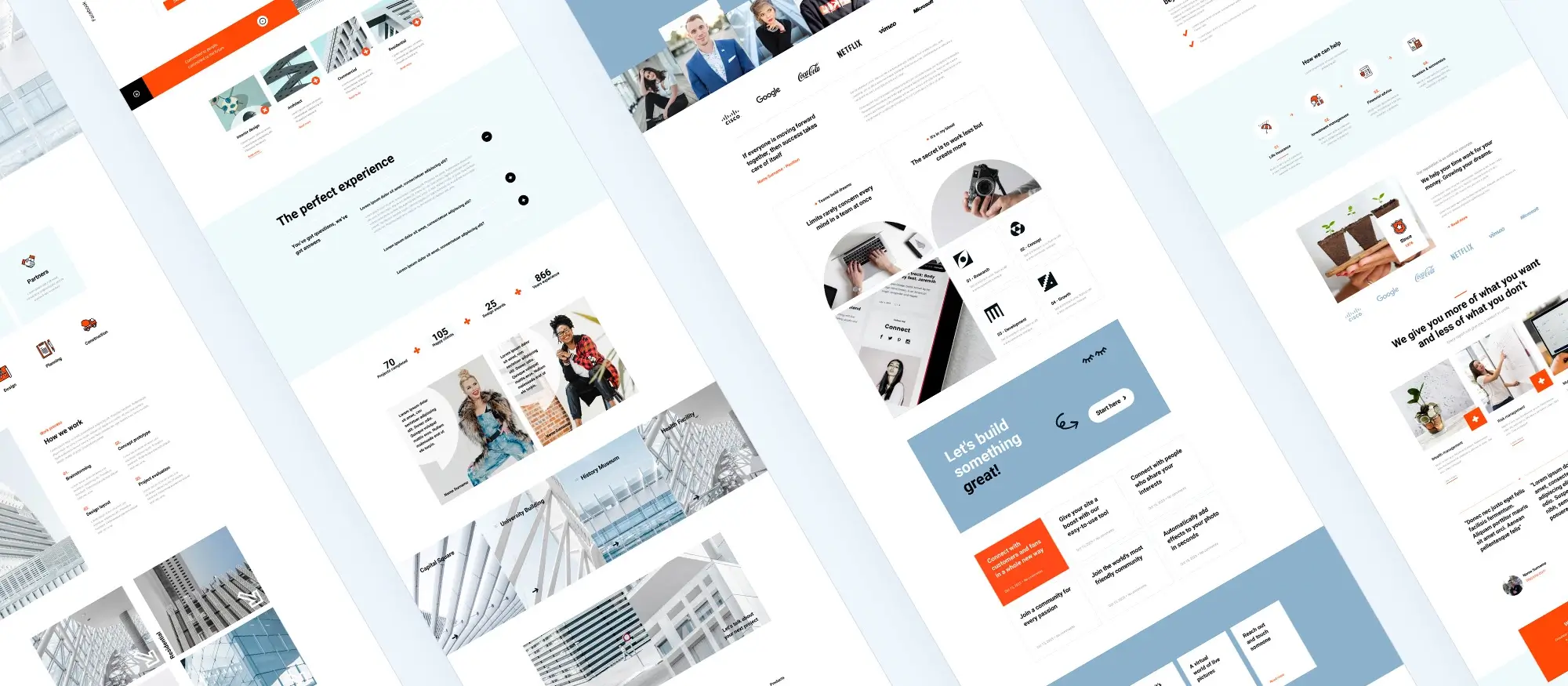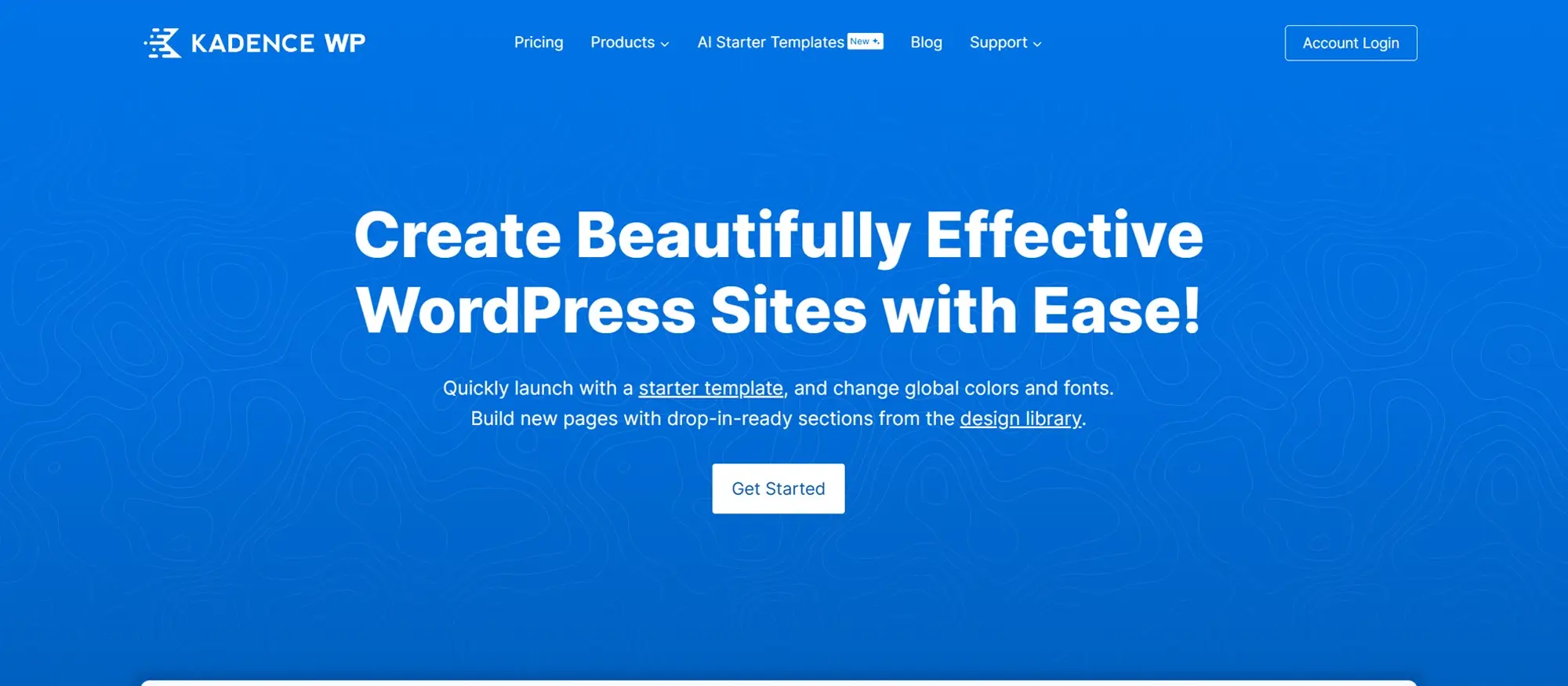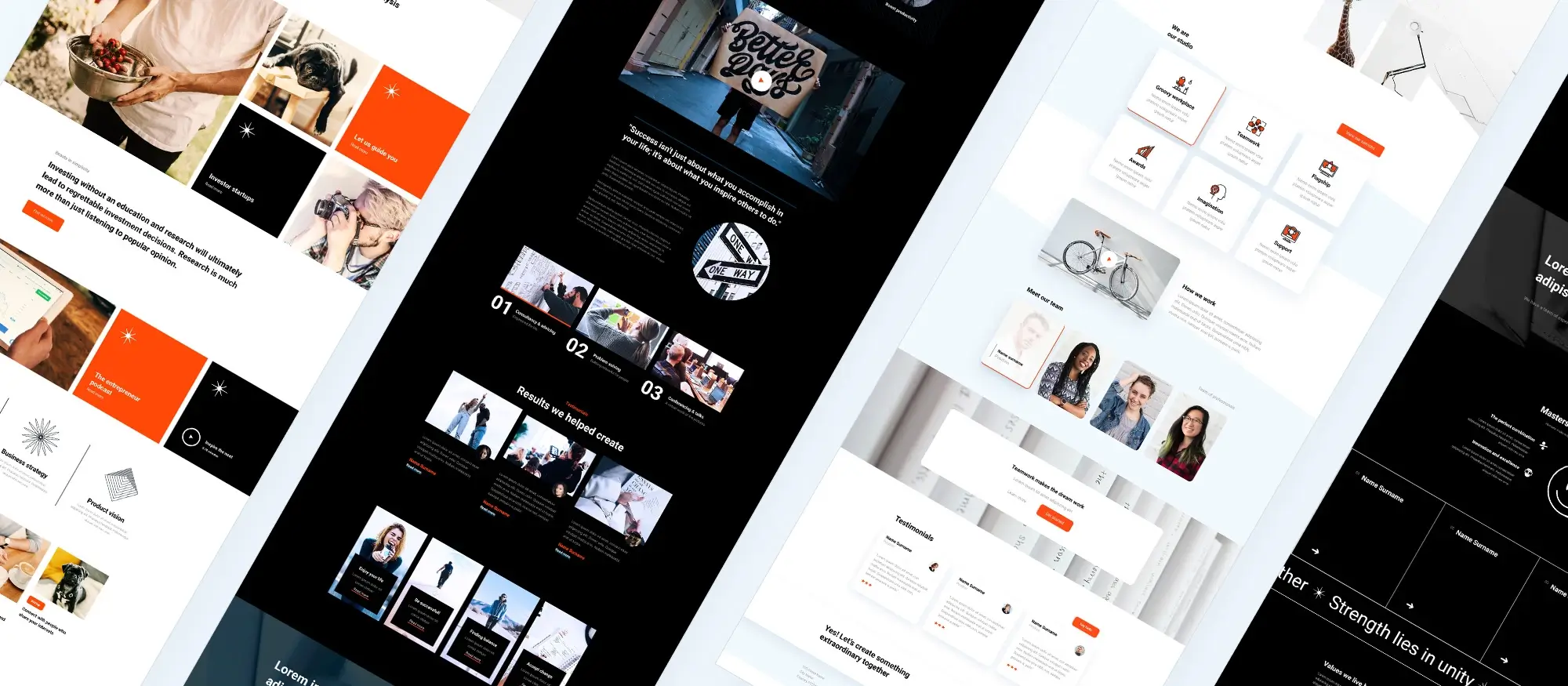What are the best Elementor alternatives for landing pages in 2025?
Try MaxiBlocks for free with 500+ library assets including basic templates. No account required. Free WordPress page builder, theme and updates included.

There are plenty of solid alternatives to Elementor for building landing pages. MaxiBlocks is a great choice for ease of use and flexibility. For more advanced customisation, tools like Divi, Genesis Pro, Bricks Builder, and Breakdance offer powerful design features. Brizy, SeedProd, and Visual Composer are also strong options, especially for users who want a simple, fast setup.
The best Elementor alternatives for landing pages in 2025
Elementor is popular, but it’s not the right fit for everyone especially if you’re building landing pages and want more flexibility without paying for upgrades. If you’re looking for something lighter, faster, and free, there are better options out there.
Why switch from Elementor?
Elementor’s moved many features behind higher-tier plans, which has frustrated users who just want to build simple, clean pages without paying extra. Some alternatives offer more control, cleaner performance, and fewer limitations.
MaxiBlocks is one of the best free WordPress page builders to consider.
MaxiBlocks: a high-performance Elementor alternative for landing pages
Whether you’re a marketer, agency, or solo creator, building high-converting landing pages shouldn’t feel like a trade-off between flexibility and speed. If Elementor feels bloated or restrictive, MaxiBlocks is a leaner, faster option that still gives you total design control without locking core features behind a paywall.
MaxiBlocks is a free, open-source page builder that runs directly inside the Gutenberg editor. Unlike Elementor, it doesn’t add heavy scripts, doesn’t require a separate interface, and doesn’t force you into an upgrade just to use basic features.
Here’s how it holds up across the landing page essentials.
Speed & performance
MaxiBlocks generates clean HTML and CSS, which translates to faster load times and better page speed scores. No extra scripts or layout shifts. You can design directly in Gutenberg using its own block library, which means fewer moving parts and better stability.
Tip: Stick to foundation blocks (container, text, image, button) for a lightweight layout, and only bring in extra effects like hover animations or SVGs where they add clear value.
Customisability
Every element is fully customisable fonts, colours, hover states, layout spacing. Use style cards to apply consistent theming across your entire landing page with one click. Unlike most builders, nothing is locked behind a subscription. You get full access to everything, from pre-designed sections to the complete SVG icon library.
Design tip: Build out your core layout using patterns, then tweak style cards until the whole page matches your brand. You can also create your own style card and save it to reuse later.
Ease of use
MaxiBlocks keeps the learning curve low. It works inside the existing Gutenberg editor, so if you’ve used WordPress before, it feels familiar. No switching to a separate interface or tool. Drag and drop sections, edit text inline, preview in real-time it’s simple but powerful.
You can start with any of the 1,400+ pattern templates, all made for common use cases like email capture, product promotion, or lead gen. All templates are modular, so you can mix and match blocks and layouts without starting from scratch.
Mobile responsiveness
It’s built with 6 responsive breakpoints, including 4K and ultra-wide monitors. Every block adjusts for mobile and tablet views without manual overrides. You also have Flexbox controls to fine-tune alignment and spacing at each breakpoint.
Pro tip: Test your CTA sections on tablet and mobile before launch. Keep form fields stacked vertically and buttons wide enough for touch.
SEO friendliness
MaxiBlocks produces clean, semantic code with fast load times key for SEO. You have full control over headings, alt text, and link structure. Plus, it plays well with SEO plugins like Rank Math and Yoast.
It doesn’t inject unnecessary wrappers or divs like many visual builders, which keeps your HTML clean and crawlable.
A/B testing support
While MaxiBlocks doesn’t have built-in A/B testing, it works well with third-party tools like Google Optimize, Split Hero, and ConvertBox. Since it’s Gutenberg-based, you can duplicate a page, change variants, and test them through your favourite split testing tool.
Tip: Use different CTAs, layouts, or headlines in each variant to test conversions properly. Keep styling and structure consistent across versions for clean data.
Pricing
💰 Free
Everything is free. No upsells, no locked blocks, no license keys, no domain restrictions. You can build unlimited sites and access the full design library including 14,000+ SVG icons, templates, and style cards.
There is no “Pro” version MaxiBlocks is 100% free and open-source. That alone makes it one of the strongest Elementor alternatives if you’re on a budget or tired of chasing feature unlocks.
Why people switch from Elementor
- Elementor has become resource-heavy, especially for mobile users
- More and more features are now behind higher-tier plans
- Page speed scores often suffer due to bloated scripts and styling
- Clunky UI that doesn’t play well with Gutenberg or block-based themes
- Too many licence restrictions for agencies and freelancers working on multiple sites
MaxiBlocks skips all that. You keep the Gutenberg workflow, get full design freedom, and don’t have to mess around with upgrades or account limits.

Gutenberg: the best no-plugin alternative to Elementor for landing pages
Whether you’re a marketer, agency, or solo creator, building high-converting landing pages shouldn’t be slow, expensive, or tied to bloated builders. Gutenberg the default WordPress editor is one of the cleanest alternatives to Elementor. No extra software, no third-party lock-in, just WordPress doing what it’s supposed to.
Here’s how it stacks up when used for landing pages:
Criteria for a good landing page builder
Speed & performance
Gutenberg doesn’t add external scripts or styles by default. That means faster load times and better Core Web Vitals scores. No extra bloat, no plugin overhead. Most modern themes are already optimised for it.
Customisability
You get block-level control for layouts, spacing, colours, typography and visibility. You can expand it further with optional plugins like GenerateBlocks, Kadence Blocks or Stackable if you need more design freedom but even out of the box, it gives you full structure control.
Ease of use
It’s not a visual drag-and-drop builder like Brizy or Elementor, but once you get the logic of blocks and patterns, it’s smooth. You can save reusable blocks, use the template editor, or insert pre-built sections from the pattern library.
Mobile responsiveness
Gutenberg layouts are mobile-first. Most blocks are responsive by default, and you can control alignment, stacking and visibility at different screen sizes without code.
A/B testing
No native A/B testing, but integrates with tools like Google Optimize, Split Hero, or third-party plugins. If you’re running serious ad campaigns, combine it with a testing plugin or service that doesn’t tie into your theme.
SEO friendliness
Built directly into WordPress, so everything from headings to metadata to semantic HTML is cleaner than what you’d get from bloated builders. Pairs well with Rank Math or Yoast for optimisation.
Pricing
Free. No locked features, no premium upsells, no domain restrictions. It’s already in WordPress, which makes it a zero-cost option unless you add paid block extensions.
Real-world use: why people are switching to Gutenberg for landing pages
“Elementor was killing my load time. Switched to Gutenberg with GenerateBlocks and my pages now load under 1.5s. Never going back.”
Design tip: how to make Gutenberg work like a true landing page builder
Start with a blank page template (disable headers and footers in your theme if needed). Use sections in this order:
- Hero (headline + subhead + call-to-action)
- Feature/benefits section (use a 3-column layout)
- Testimonials (quote block or media-text combo)
- Lead capture form (add using WPForms or Fluent Forms)
- Final CTA
Use GenerateBlocks for more layout flexibility without loading a page builder. It gives you grid controls, containers, buttons, and advanced spacing settings without the clutter.
Keep colours and fonts consistent by setting your palette in the site editor. Use patterns to save time WordPress has hundreds available for free, or you can save your own.
💰 Pricing summary
Gutenberg is free and already installed in WordPress. You don’t need to pay for anything unless you want extra design features via block plugins.
Compare that to Elementor:
- Elementor Free: basic widgets, no theme builder
- Elementor Pro: $59/year for 1 site, $199/year for 25 sites
- Locked widgets, paywalled templates, and more scripts on your pages
Gutenberg is a no-cost alternative for those who care about speed, clean code, and having full control of their site.
Why people look for alternatives:
- Elementor slowing down performance
- Too many features locked behind Pro
- Drag-and-drop sometimes causing layout bugs
- Poor compatibility with other Gutenberg-based tools
Subscribe to our newsletter
Bricks Builder: performance-focused, developer-friendly
Bricks is a full site builder with a clean interface and high performance out of the box. It’s built using modern code and runs inside the WordPress theme layer, so it’s fast and SEO-friendly. For landing pages, it gives you full design control with no fluff.
Criteria breakdown
- Speed & performance: Bricks outputs lightweight code and ranks high on Core Web Vitals. Many devs report significant performance gains switching from Elementor.
- Customisability: Full control via UI and custom CSS. Built-in conditions, dynamic data support, and flexible layout options.
- Ease of use: More intuitive than Oxygen but has a learning curve. Not as plug-and-play as Breakdance, but once you’re in, it’s fast.
- Mobile responsiveness: Full responsive controls with breakpoints. You can customise layouts per device without extra plugins.
- A/B testing: No native A/B testing, but can integrate with tools like Google Optimize or Split Hero.
- SEO friendliness: Clean output, no inline bloat, schema and meta support with SEO plugins.
- Pricing: Lifetime licence for unlimited sites. No hidden upsells or feature locks.
Design tip for landing pages
Use container + stack layout for better structure. Avoid stacking too many nested divs. Bricks lets you use global classes and styles set those early for colours, buttons, and typography to speed things up. Leverage dynamic data for countdowns, user-specific CTAs or geo-based offers if you’re pulling info from custom fields.
Breakdance: speed meets simplicity
Breakdance is a newer builder made by the team behind Oxygen, but built for speed and ease. Unlike Oxygen, you don’t need to know code. Breakdance is ideal for creators who want drag-and-drop simplicity but still care about performance.
Criteria breakdown
- Speed & performance: Leaner than Elementor. Breakdance generates clean HTML/CSS with minimal overhead.
- Customisability: Strong styling tools, global controls, custom headers/footers, and WooCommerce support. Not as dev-focused as Bricks but very capable.
- Ease of use: Extremely beginner-friendly. UI is clean, and everything is inline. Great for visual thinkers.
- Mobile responsiveness: Strong responsive settings, live preview across devices, and simple stacking controls.
- A/B testing: No built-in A/B testing, but can integrate with third-party platforms easily.
- SEO friendliness: Great output with SEO plugin compatibility. Minimal DOM bloat.
- Pricing: One flat price for unlimited sites. Includes WooCommerce support at no extra charge.
Design tip for landing pages
Use Breakdance’s section templates to move faster then swap out text, images and CTAs with your own. Keep the above-the-fold section minimal with a headline, subhead and form or button. Use their animation controls sparingly (e.g. fade on scroll) to avoid slowing down the page.
If you want more control and don’t mind learning a system, Bricks gives you raw power and performance with clean code. If you want quick drag-and-drop simplicity without the Elementor mess, Breakdance is fast, modern, and easy to use for high-converting landing pages.

Additional Elementor alternatives for landing pages
Divi
Divi comes with a massive library of pre-built layouts and animation effects. It’s flexible and known for being easy to customise. You can use their visual builder to adjust every element live.
Ideal for: Marketing teams, designers, or anyone looking to tweak existing designs with pixel control.
How to use: Install Divi, pick a layout from the library, swap in your content, and adjust styles using the visual editor.
Kadence
Kadence is all about speed and conversions. It uses clean code, pre-built designs, and an intuitive editor that doesn’t get in your way. It’s lightweight and works great with Gutenberg.
Ideal for: Beginners or solo creators who want fast-loading pages and clean design without learning curve.
How to use: Install the plugin or theme, use their visual editor and blocks to build a layout, and hit publish. Most templates are ready to go with minimal setup.
Build like a pro
How do free Elementor alternatives compare to Elementor?
Free Elementor alternatives like MaxiBlocks, Gutenberg, Brizy, Bricks builder, and Breakdance offer a wide range of features, including drag-and-drop interfaces, extensive customisation options, and responsive design capabilities. They also provide pre-made templates, saving time and effort in building a website. While Elementor offers a lot of functionality, its free version is limited compared to these alternatives.
Can these free Elementor alternatives handle complex projects?
Many free page builders can handle complex projects. MaxiBlocks offers dynamic content and interactive elements, while Brizy and Bricks builder provide extensive customisation options and reusable templates. These Elementor alternatives are great for advanced website needs, allowing you to build professional and intricate landing pages.
Limitations of free Elementor alternatives
Free page builders might have fewer advanced features compared to their paid versions, and some customisation restrictions might exist. However, for many users, these free Elementor alternatives provide functionality to create a professional website.
How MaxiBlocks stands out
MaxiBlocks offers a comprehensive set of features entirely for free, including custom blocks, a vast design library, and responsive design capabilities. It’s particularly appealing for those wanting to build beautiful websites without high costs, making it a top Elementor alternative.
Final thoughts
Finding the right website builder is important for creating effective landing pages. While Elementor is a popular choice, its high costs and limited free features make exploring other options worthwhile. MaxiBlocks, Gutenberg, Brizy, Bricks builder, Breakdance, Divi, and Kadence are excellent Elementor alternatives, each offering unique features to help create a stunning website.
Discover the best Elementor alternatives for WordPress
Explore a complete collection of Elementor alternatives with tips, comparisons, and tutorials for every type of WordPress site.
FAQs about Elementor alternatives for landing pages
What are some good Elementor alternatives for landing pages?
One notable Elementor alternative for landing pages is MaxiBlocks. It provides a comprehensive set of features tailored for creating high-converting landing pages, ensuring flexibility and ease of use.
Why should marketers consider MaxiBlocks as one of the Elementor alternatives for landing pages?
MaxiBlocks offers advanced customization options, seamless integration with various marketing tools, and a user-friendly interface. This makes it an excellent choice for marketers looking for efficient Elementor alternatives for landing pages.
How does MaxiBlocks compare to other Elementor alternatives for landing pages?
MaxiBlocks provides similar functionalities to Elementor but with additional features designed specifically for landing pages, such as conversion optimization tools, customizable call-to-action elements, and enhanced performance optimizations.
Can MaxiBlocks handle large-scale campaigns as one of the Elementor alternatives for landing pages?
Yes, MaxiBlocks is designed to manage large-scale campaigns effectively. It supports robust campaign management features, high scalability, and efficient workflows suitable for creating and managing multiple landing pages.
Is MaxiBlocks cost-effective as one of the Elementor alternatives for landing pages?
MaxiBlocks offers competitive pricing plans that cater to the budgetary constraints of marketers. With its feature-rich platform, it provides great value for money, making it a cost-effective Elementor alternative for landing pages.
What kind of support can marketers expect from MaxiBlocks as an Elementor alternative for landing pages?
MaxiBlocks provides excellent customer support, including dedicated assistance for landing pages. This includes comprehensive documentation, tutorials, and a responsive support team to help with any issues.
Does MaxiBlocks offer design templates and themes suitable as an Elementor alternative for landing pages?
MaxiBlocks comes with a wide range of professional templates and themes tailored for landing pages. These templates are highly customizable, allowing marketers to create unique and visually appealing landing pages that convert.
How easy is it to migrate from Elementor to MaxiBlocks as an Elementor alternative for landing pages?
MaxiBlocks offers straightforward migration tools and support to help marketers transition from Elementor smoothly. This ensures minimal downtime and disruption during the migration process.
Can MaxiBlocks be integrated with other tools commonly used for landing pages as an Elementor alternative for landing pages?
MaxiBlocks supports integration with a variety of third-party tools and services commonly used for landing pages, such as CRM systems, email marketing platforms, and analytics tools, enhancing its versatility as an Elementor alternative for landing pages.
Want to read more?
Take a look at what’s better than Elementor for WordPress, or find out if Elementor is still free in 2025. Curious how it compares to Gutenberg? Read which is better: Gutenberg or Elementor and whether Elementor is better than Gutenberg in 2025. You can also explore alternatives better than Elementor or browse the full list of Elementor alternatives.
WordPress itself
Official Website
wordpress.org – This is the official website for WordPress, where you can download the software, find documentation, and learn more about using it.
WordPress Codex
codex.wordpress.org/Main_Page – This is a comprehensive documentation resource for WordPress, covering everything from installation and configuration to specific functionality and troubleshooting.
WordPress Theme Directory
wordpress.org/themes – The official WordPress theme directory is a great place to find free and premium WordPress themes. You can browse themes by category, feature, and popularity.
maxiblocks.com/go/help-desk
maxiblocks.com/pro-library
www.youtube.com/@maxiblocks
twitter.com/maxiblocks
linkedin.com/company/maxi-blocks
github.com/orgs/maxi-blocks
wordpress.org/plugins/maxi-blocks

Kyra Pieterse
Author
Kyra is the co-founder and creative lead of MaxiBlocks, an open-source page builder for WordPress Gutenberg.
You may also like

